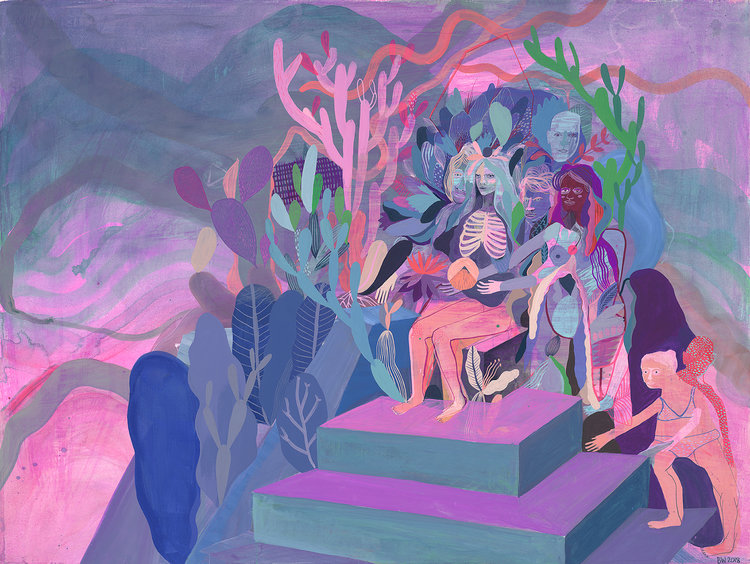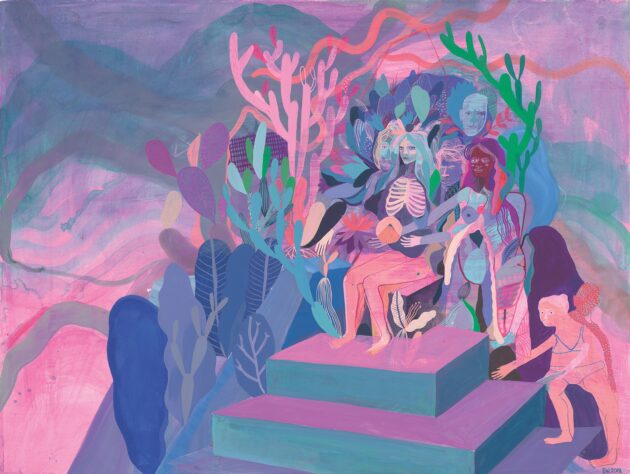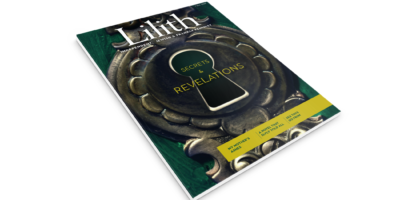
Fiction: Philology
PICTURE IT, BERLIN, 1934. Charlotte walks down the aisle of a train wearing a deep purple hat with a little black veil that she does not pull down. Her blond hair peeks out beneath. Her shoes are too big, but they are fashionable with short stacked heels and suede buckles. Her nails are filed nearly to points and painted a curdled blood red like Marlene Dietrich’s. She can still feel her mother’s kiss on her cheek. She does not know that she will never see her again. She is 16.
Charlotte finds a seat next to a man who is young but no longer a boy, with a strong jawline, soft-looking skin, and a nice smell. The thick waves of his dark hair are pomaded into place and cut short. He smiles kindly, but quickly averts his honey brown eyes. She stares past him, out of the window, watching the landscape slide from city center into industrial, suburban and then rural. Every so often, her eyes flick to the starched button placket of his white shirt or the pleats of his wool slacks. She adjusts her hat on her blond hair and imagines the square shapes of America.
“Where are you going?” the gentleman asks with crisp German diction. This is how Charlotte’s teachers would have liked her to sound. An elocution that erased her native Yiddish.
“To Le Havre. It is the final stop,” Charlotte answers, dipping her head and looking askance the way she has seen Greta Garbo do in Grand Hotel. “I intend to tour there before my ship leaves for America.”
“America—how exciting! Such a big trip for a young lady.” He takes out a handkerchief with a curious symbol embroidered on it, a diamond shape with two bent legs coming out of the bottom point, like a little bug. Charlotte has seen it somewhere before. He uses it to wipe the green leather armrests on either side of him, as Charlotte tries to place the strange diamond symbol, but cannot. His wiping draws a smile to Charlotte’s lips that she tries to suppress. The man’s eyes crinkle as he grins back, shrugging his shoulders, acknowledging his own fussiness. Charlotte feels relieved by this honest response. “Ah well, who knows who has been here before us. You can never be too careful these days. I hope you will have someone to watch out for you in America.” His smile becomes lopsided at this.
Charlotte does not answer. Her mother is sending her to stay with her cousins in New York. She did not want to leave at first, but her mother and her older half-sisters decided it would be best. They will find another plan for Charlotte’s only full sister, Erna, who is older than Charlotte by only nine months. They are often mistaken for twins; sometimes Charlotte, who is not so afraid of the world, is mistaken for the older of the two. The early spring sun makes high noon patterns on the stone walls of the cottages and the church spire in the village they are passing through. Charlotte wishes she had her sister next to her to elbow—see how beautiful? But she is alone.
“Well,” says the German. “I am en route to Paris. We shall arrive there in the morning and have a stop. Perhaps you will accompany me for a coffee.” It is an invitation, but it is a statement, one not intended to be answered.
Charlotte nods politely, takes in his wood and leather smell, bats her eyelashes, runs her fingers over the slick-feeling fingernails that have never before been polished.
“I must say,” the gentleman adds as he opens a newspaper, “you do have the most beautiful blue eyes.” This makes Charlotte’s belly go hot as she thanks him and he turns to his newspaper.

Betsy Walton, “Testify.” Morningcraft.com
CHARLOTTE HAS BEEN ON A TRAIN only once before. She and her sister went to visit their grandparents on their farm in Poland when she was seven and Erna was nearly eight. They traveled alone for two days with paper notes strung around their necks in case they got lost—like luggage: names, destination, ages, train numbers. On the final leg of the trip Erna began snoring on the shoulder of an old man. He was a Polish peasant in his best, but coarse clothes and he was missing several teeth. Charlotte elbowed her sister awake. Their mother had told them never to touch a stranger. In his Polish-inflected Yiddish, the old man insisted he didn’t mind because it reminded him of his own grandchildren. “Sleep, sleep, tatellah,” he told the scared little girl. But Charlotte moved them to a different seat anyway.
Charlotte was a devil then. She didn’t like her grandfather’s long beard because it scratched her when she kissed him. So one day, when he took her on his lap, she hid a pair of scissors behind her back and tried to cut it off. He pretended to be mad at her, said he would sentence her to a day of floor mopping, but Charlotte couldn’t stop giggling, and soon he was laughing and tickling her. He gave her a chocolate from his secret pouch in the bookcase behind the Talmud. “The words of our forefathers are sweet,” he explained. He used to teach her commentary, even though she was a girl. He had deprived his four daughters, but it was easy to indulge a granddaughter.
She carries those sweet words in her now, as much a part of her body as the chocolate. In the Talmud, her grandfather read her the lesson of Zelophehad, whose daughters won the right for women to inherit their father’s land if they had no brothers. “Ah, tatellah,” her grandfather used to call her, “My little blond daughter of Zelophehad, my blue-eyed shikselah.”
Charlotte would like to be the head of her own tribe. That way, her four older sisters could get married instead of taking jobs in Leeds and Amsterdam. Erna, the skinny one, the shy one, could stay in school, even go on to university. Her mother could go back to dolefully drying her dishes and ringing out all their gray underwear, singing in Yiddish of a Rabbi teaching children their A,B,C’s and of the sweetness of Ruth. Charlotte would have a shield emblazoned with a rabbit, symbol of the hurdles she used to scale on the school track team. That is, until last year, when her father was killed and her mother had to take a job. Charlotte quit school to run the household, but now she would have a poison tipped spear like an Amazonian. Her helmet would be made of unbreakable glass and shaped like Roman armor. When some Reicher in the street yelled an insult about weak Jews, Charlotte would spear him in the behind and post him dangling from his underpants in front of her house.
CHARLOTTE LETS HER CHEEK REST against the horsehair headrest. It smells of the oils of many people’s unwashed hair, but she makes herself remain still. She flutters her eyes closed, lets her hand rest near her seatmate’s pressed trousers, feeling the pattern of the tapestry cushion against the backs of her fingers. The man is sleeping now, and Charlotte wonders what would happen if, like her sister on that train long ago, she happened to fall asleep on the shoulder that is just inches from her nose.
Suddenly, the man’s hand flops like a dead fish next to hers. There is a rash on the palm and it has opened into a deep sore just above his lifeline. The ring finger twitches and Charlotte notices the gold band at its base. She tries to be still, but her fingers seem to have a life of their own. Her pointer finger touches the hard metal, just for a second. Then it reaches towards the bulls-eye palm of his hand, oh so lightly, oh so lightly. Her finger tries to withdraw quickly, but the hand is suddenly awake. It grabs her finger. The thumb rubs it, just for a second and oh so lightly; then the hand lets go. Charlotte forgets to breathe. To look at her seatmate’s face, you would think he was still asleep.
Charlotte has held hands with only one boy. In Berlin, she had a boyfriend named Klutz whose grandmother was Hungarian. He taught her how to say taffy and iron and flying squirrel. He recited Hungarian poetry to her in the park at night, when she was supposed to be at the ice cream shop with her sister. She remembers her hair flying out behind her, the stars that seemed so close as they stood on the hill, the prickly grass beneath their feet, the outline of Berlin just beyond the edges of Klutz’s soft earlobe that she loved to kiss, and his urgent voice whispering marble-mouthed lyrics in between bites on her neck. Klutz is gone now, his family taken in the middle of the night, nobody knows where. Of the Hungarian, she only remembers flying squirrel: repeleh kishmokush. She whispers the word on the train and the man by the window turns his face to hers.

“Do you speak Hungarian?” he asks with a voice that suggests a recent ungluing of tongue from soft palette. He looks tender in his sleepy surprise.
“I only know that one word,” she says, the corners of her lips pulling upwards, her eyes absorbing the yellow light of sun. “I thought you were asleep.”
“Do you know what it means?” He looks so sincere. She wants to laugh. It is not a secret code, she wants to tell him. Secret codes—not even money—would have helped her family when her father was dragged to jail for refusing to use his toothbrush to clean the gutter. He was beaten to death there and they were not allowed to bury him.
“Of course,” she says, smoothing back her bangs beneath the veil and imagining herself a sophisticated French lady. She thinks of how it will be when she gets to Le Havre. She wishes she smoked. She would use a long elegant holder as she strolled in and out of fancy shops, buying delicately molded marzipan and lavender soap to send back to her mother and sisters, whom she has never spent a night without. She pictures this man following her to Le Havre, holding her packages, lighting her cigarette, buying her a glass of red wine. Her legs jiggle with excitement and fear.
“Do you?” He turns towards her, his jaw loosening and his eyebrows rising in interest. “It is ‘flying squirrel’ you know.”
“I do know. How do you?” Her face is open again with curiosity.
“I’m a philologist,” he says, “I study the ancient languages of Europe.”
“Are you a professor?” asks Charlotte.
“Not exactly.” A strange expression comes over his face, as if this were a difficult question. His brows knit, his mouth slightly open. He takes the handkerchief from his pants pocket and wipes the window, where his head has left a mark from pomade. Then he wipes his forehead.
“I see,” says Charlotte, nodding her head, feeling her cheeks warm in embarrassment. Perhaps this was a stupid thing to ask him. Perhaps philologists don’t work at universities. She wonders if the bug-like symbol on the handkerchief has something to do with his work, with languages.
“I, I do …” ahem “… cultural research,” he answers finally. He gives a cough that sounds forced.
A CONDUCTOR IS MAKING HIS WAY down the aisle. “Tickets, please.” He holds out his meaty, pink hand. “We are serving cocktails in the dining car, if you would be so inclined, sir.” With raised eyebrows, he looks at Charlotte sitting next to the man. “We also have sodas, tea, and snacks.”
“Very good,” says the man. Other people are beginning to rise, to gather their handbags, to stretch or look for their hats on
the rack above the seats. A drink sounds good, right now. “Heil Hitler,” her seatmate tosses this off as if it were “Good evening.” Her chest compresses.
“Heil Hitler,” the conductor answers tonelessly, eyes on the stamped ticket he hands back to Charlotte, his face a blank. He rifles through papers as he turns up the aisle towards the next row of seats.
“Perhaps we shall have our coffee now, eh?” The man cocks his head, smiling brightly, the strain now gone from his face. He sets his bowler atop his unmoving hair.
“Perhaps,” says Charlotte coyly. A tight smile presses her painted lips together. She drops her head and glances down, accentuating her penciled-on eyebrows. She grabs her fringed shawl from the rack above the seats, sits down, and spreads it over herself. She lets her knees fall open, so that one touches the man’s thigh. There, the shawl dangles, wisping onto his thick corduroy pants. Charlotte stares at the woolen backs of the people leaving the train. Only an elderly woman remains, snoring into the window, which shows a collage of greens blurring together. Charlotte breathes slowly, can feel only her burning right knee.
We see her there on the floral-patterned seat, her hand fiddling with the locket her mother gave her, and we see her in New York, amazed by the black people, amazed by the height of the buildings, lost in a hurricane of language, dizzied by trains and lights and men whistling at her. We see her making out behind mid-town dance halls, and pricking her finger many times over in the hat factory all the way down by Sheepshead Bay, and read- ing the funny papers to learn English, and playing badminton with her cousin Gertie at Jones Beach in a bathing suit, and hanging upside down on the monkey bars at the playground in a schoolyard in the Bronx on a summer night after all the children have gone home, letting the tears run the wrong way, down her forehead and into her hair until they splat in the dirt beneath her.
And she will never be the same girl again as she is in this moment, when her mother and sisters are still alive, when Klutz and Berlin are the only homes she has known, when German and Yiddish and one word in Hungarian are the only languages she speaks. No, she will get married and have her own children and take vacations in a bungalow by a lake, eat tuna fish with hard boiled eggs, swim the breaststroke, sew buttons onto countless broadcloth cuffs, buy an Edsel, sneak cigarettes on the fire escape, masturbate with her middle finger, and once, she will hit her son so hard that he will fall down the stairs and break his arm and she will never forgive herself, never. And the son will grow up to give Charlotte a granddaughter and she will tell all her stories to the little girl who will ask to hear the stories again and again and picture them as if she had lived them herself. But Charlotte doesn’t know any of this now. Now, she knows only that her thighs are tingling and her cheeks are flushed.
The man again wipes his forehead with his handkerchief and Charlotte is again caught by its strange runic symbol. The man replaces the handkerchief in his breast pocket and pulls the shawl over his lap. Then he props his elbow on the armrest by the window, and pretends to look out of it. His other hand reaches nonchalantly beneath the shawl. Charlotte feels like she’s in a submarine, able to see above and below the surface at the same time. Her head is still on the headrest, watching people file back with their coffees, cigarettes, magazines, and cookies, but she can picture what’s happening below the shawl at the same time. His hand touches her knee. Her leg melts into his hand—sandpapery and knuckly. She must concentrate to breathe. The handkerchief is sticking out of his pocket.
Suddenly, she knows what that bug-like symbol means. She has seen it before. It was tattooed on the forearm of the S.S. man who knocked her father to his knees, forced open his jaws, and pushed the toothbrush so far down his throat that he was sick in front of the entire, jeering crowd. The hand is reaching for her hand now. It has it. She can feel the heat emanating from his crotch. It is pulling her hand towards his erection. She finds the tiny cut near the pinky joint. She digs in her sharp, red thumbnail and rips as hard as she can.
Rachel Howe is a writer and grant writer. A grandchild of survivors, she often grapples with the Holocaust and is Vice President of 3G Philly.
ART: Betsy Walton, “Testify.” Morningcraft.com


